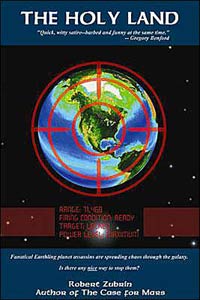Review: The Holy Landby Taylor Dinerman
|
| Zubrin takes on a number of ripe targets: homeland security, feminism, astrophysics, the oil industry, the sex industry, and the State Department. |
The Minervans are pretty much indifferent to the induced suffering of the Kennewickian terrorist children, but the Galactic News Service and its ace reporter, the Minervan-hating Kolta Bruna (based on the BBC’s Orla Gurein), uses the suffering of the little “martyrs” as the centerpiece of her reporting. When a Kennewickian doctor and an American soldier try to stop the children from bleeding to death she complains, “These two Earthlings are ruining out footage. On behalf of the Galactic News Service I demand they be removed so the story can be photographed as planned.” The satire is executed perfectly.
In fact Zubrin takes on a number of ripe targets: homeland security, feminism, astrophysics, the oil industry, the sex industry, and the State Department. So far in the 21st century no one should complain about the lack of subjects that need satirizing. Although it’s a first novel, it suffers from few of the usual flaws of that genre. No post-adolescent angst, no obsessions with style, nor any attempts to conform to what a creative writing teacher may have said. The flaws are those of a writer who is too sure that his readers will get all of his sneaky references to science and politics. A roman à clef needs to deal with subjects that are nearly universal, but here some of the references are obscure, even to specialists.
No one could misread the allusion when the American president explains to the galactic diplomat, “This is not about territory, it is about principles. The Minervan presence in Kennewick is a defilement. We cannot have pagans polluting Christian land with their unholy presence. We have a God given duty to exterminate them.”
Zubrin’s portrait of the Minervans themselves is in parts all too accurate. Their arrogance and their internal squabbles over theology, science, and law are replicated in our real world. Although he does not even attempt to reproduce the antics of the Knesset he shows that the Israelis are often overwhelmed by the contradictory requirements the so-called “international community” tries to impose. This tends to explain why, as a civilized people, they fail miserably to understand the savages they are fighting against.
The dilemmas of the Western Galactic Empire (Weegees) are treated with the same irreverence as is the depraved corruption of the American government. Like all good satires this one spares nobody. It deserves a greater readership than it has achieved so far.
